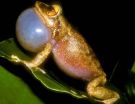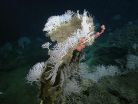(Press-News.org) DARIEN, IL – A new study shows that moderate to severe obstructive sleep apnea is independently associated with an increased risk of stroke, cancer and death.
Results of the 20-year follow-up study show that people with moderate to severe obstructive sleep apnea were four times more likely to die (hazard ratio = 4.2), nearly four times more likely to have a stroke (HR = 3.7), three times more likely to die from cancer (HR = 3.4), and 2.5 times more likely to develop cancer. Results were adjusted for potential confounding factors such as body mass index, smoking status, total cholesterol and blood pressure.
"Sleep apnea is a common disease that has a powerful impact on public health because it greatly increases the risk of strokes, cancers and mortality from any cause," said lead author Nathaniel S. Marshall, PhD, senior lecturer in clinical trials at the University of Sydney in Australia.
Study results are published in the April 15 issue of the Journal of Clinical Sleep Medicine, which is published by the American Academy of Sleep Medicine.
The study involved 397 adults who are participating in the ongoing Busselton Health Study. Objective sleep data were gathered in 1990 using a portable home sleep testing device. Participants with a history of stroke or cancer were excluded from selected analyses.
Prevalence rates were 4.6 percent for moderate to severe OSA and 20.6 percent for mild OSA. During the 20-year follow-up period there were 77 deaths and 31 strokes, as well as 125 cancer events that included 39 fatalities. Mild sleep apnea was not associated with increased health risks.
"Obstructive sleep apnea is a chronic disease that can be destructive to your health," said American Academy of Sleep Medicine President Dr. Safwan Badr. "People with symptoms of sleep apnea, such as loud and frequent snoring or silent pauses in breathing during sleep, should see a board certified sleep medicine physician for a comprehensive sleep evaluation."
The authors noted that the results of their study are consistent with the findings of previous research conducted in the U.S. and Spain.
The research was supported by grants from the National Health and Medical Research Council in Australia.
The American Academy of Sleep Medicine reports that obstructive sleep apnea is a common sleep disorder that affects up to seven percent of men and five percent of women. It involves repetitive episodes of complete or partial upper airway obstruction occurring during sleep despite an ongoing effort to breathe. The most effective treatment option for OSA is continuous positive airway pressure (CPAP) therapy, which helps to keep the airway open by providing a stream of air through a mask that is worn during sleep.
INFORMATION:
To request a copy of the study, "Sleep apnea and 20-year follow-up for all-cause mortality, stroke, and cancer incidence and mortality in the Busselton Health Study Cohort" or the related commentary, "Emerging from the shadows: A possible link between sleep apnea and cancer," or to arrange an interview with the study author or an AASM spokesperson, please contact Communications Coordinator Lynn Celmer at 630-737-9700, ext. 9364, or lcelmer@aasmnet.org.
The monthly, peer-reviewed Journal of Clinical Sleep Medicine is the official publication of the American Academy of Sleep Medicine, a professional membership society that improves sleep health and promotes high quality patient centered care through advocacy, education, strategic research, and practice standards (http://www.aasmnet.org). The AASM encourages patients to talk to their doctor about sleep problems or visit http://www.sleepeducation.org for a searchable directory of AASM-accredited sleep centers.
Study links severe sleep apnea to increased risk of stroke, cancer and death
Results confirm that obstructive sleep apnea is a public health hazard
2014-04-14
ELSE PRESS RELEASES FROM THIS DATE:
Shared decision making during radiation therapy improves patient satisfaction
2014-04-14
PHILADELPHIA—Playing an active role in their radiation treatment decisions leaves cancer patients feeling more satisfied with their care, and may even relieve psychological distress around the experience, researchers from the Perelman School of Medicine at the University of Pennsylvania report in the journal Cancer.
In a study of 305 patients undergoing radiation treatment, Neha Vapiwala, MD, an associate professor in the department in Radiation Oncology at Penn Medicine, and colleagues at link "Penn's...Center: Penn's Abramson Cancer Center found an association between ...
Plague alters cell death to kill host
2014-04-14
Northwestern Medicine scientists are continuing to unravel the molecular changes that underlie one of the world's deadliest and most infamous respiratory infections.
When the bacterium Yersinia pestis enters the lungs, it causes pneumonic plague, a disease that is 100 percent fatal if untreated. The way in which Y. pestis evades the immune system and kills people in a matter of days has largely confounded scientists, until now.
Following a 2007 study demonstrating that the presence of a protein called the plasminogen activator protease (Pla) is required for Y. pestis ...
Climate change a likely culprit in coqui frog's altered calls, say UCLA biologists
2014-04-14
Changes in the Puerto Rican climate over the past three decades have caused small but significant changes to the coqui frog, the territory's national animal. UCLA biologists have found that not only have male coquis become smaller, but their mating call has also become shorter and higher pitched.
Authored by Peter Narins, UCLA distinguished professor of integrative biology and physiology and of ecology and evolutionary biology, and Sebastiaan Meenderink, a UCLA physics researcher, the study examined 170 male coqui frogs (Eleutherodactylus coqui) in 1983 and then 116 ...
Making dams safer for fish around the world
2014-04-14
RICHLAND, Wash. – Think of the pressure change you feel when an elevator zips you up multiple floors in a tall building. Imagine how you'd feel if that elevator carried you all the way up to the top of Mt. Everest – in the blink of an eye.
That's similar to what many fish experience when they travel through the turbulent waters near a dam. For some, the change in pressure is simply too big, too fast, and they die or are seriously injured.
In an article in the March issue of the journal Fisheries, ecologists from the Department of Energy's Pacific Northwest National ...
Cosmic slurp
2014-04-14
Somewhere in the cosmos an ordinary galaxy spins, seemingly at slumber. Then all of a sudden, WHAM! A flash of light explodes from the galaxy's center. A star orbiting too close to the event horizon of the galaxy's central supermassive black hole is torn apart by the force of gravity, heating up its gas and sending out a beacon to the far reaches of the universe.
In a universe with tens of billions of galaxies, how would we see it? What would such a beacon look like? How would we distinguish it from other bright, monumental intergalactic events, like supernovas?
"Black ...
Researchers identify children with emotional behavior difficulties
2014-04-14
Research on children orphaned by HIV/AIDS in South Africa may provide insight on how to identify and help children with emotional behavior issues in other areas of the world, which may have limited access to healthcare and further research that could lead to successful interventions.
A report on the global AIDS epidemic published by the United Nations mentions that due to the HIV/AIDS pandemic, which has left 12 million children orphaned in Sub-Saharan African, children are at an increased risk for mental health problems.
"There has been a big push to understand what ...
Henry Ford Hospital hits new heart valve surgery milestone
2014-04-14
DETROIT – Doctors at Henry Ford Hospital reached a medical milestone April 3, performing the 25th successful transcatheter valve replacement using a novel way to access the heart.
Henry Ford is the only hospital in the United States performing the unique procedure called transcaval valve replacement, which accesses the heart by temporarily connecting major blood vessels.
Northern Michigan resident Viola Waller, 80, underwent Henry Ford's first transcaval procedure on July 3, 2013 when traditional valve replacement was not medically viable.
"Nobody could help me here," ...
Dog ownership benefits families of children with autism, MU researcher finds
2014-04-14
COLUMBIA, Mo. –Many families face the decision of whether to get a dog. For families of children with autism, the decision can be even more challenging. Now, a University of Missouri researcher has studied dog ownership decisions in families of children with autism and found, regardless of whether they owned dogs, the parents reported the benefits of dog ownership included companionship, stress relief and opportunities for their children to learn responsibility.
"Children with autism spectrum disorders often struggle with interacting with others, which can make it difficult ...
Rare bone diseases and their dental, oral and craniofacial manifestations
2014-04-14
Alexandria, Va., USA – The International and American Associations for Dental Research (IADR/AADR) have published a paper titled "Rare Bone Diseases and Their Dental, Oral, and Craniofacial Manifestations." The complete review by researchers Sunday O. Akintoye, Andrea B. Burke, Alison M. Boyce, Michael Collins, Brian L. Foster, Rachel I. Gafni, Janice S. Lee, Mary Scott Ramnitz, Martha J. Somerman and J. Timothy Wright is published in the OnlineFirst portion of the IADR/AADR Journal of Dental Research (JDR).
Hereditary diseases affecting the skeleton are heterogeneous ...
Researchers describe 4 new species of 'killer sponges' from the deep sea
2014-04-14
MOSS LANDING, CA — Killer sponges sound like creatures from a B-grade horror movie. In fact, they thrive in the lightless depths of the deep sea. Scientists first discovered that some sponges are carnivorous about 20 years ago. Since then only seven carnivorous species have been found in all of the northeastern Pacific. A new paper authored by MBARI marine biologist Lonny Lundsten and two Canadian researchers describes four new species of carnivorous sponges living on the deep seafloor, from the Pacific Northwest to Baja California.
A far cry from your basic kitchen sponge, ...
LAST 30 PRESS RELEASES:
Eleven genetic variants affect gut microbiome
Study creates most precise map yet of agricultural emissions, charts path to reduce hotspots
When heat flows like water
Study confirms Arctic peatlands are expanding
KRICT develops microfluidic chip for one-step detection of PFAs and other pollutants
How much can an autonomous robotic arm feel like part of the body
Cell and gene therapy across 35 years
Rapid microwave method creates high performance carbon material for carbon dioxide capture
New fluorescent strategy could unlock the hidden life cycle of microplastics inside living organisms
HKUST develops novel calcium-ion battery technology enhancing energy storage efficiency and sustainability
High-risk pregnancy specialists present research on AI models that could predict pregnancy complications
Academic pressure linked to increased risk of depression risk in teens
Beyond the Fitbit: Why your next health tracker might be a button on your shirt
UCSB scientists bottle the sun with liquid battery
Lung cancer drug offers a surprising new treatment against ovarian cancer
When consent meets reality: How young men navigate intimacy
Siemens Healthineers and Mayo Clinic expand strategic collaboration to enhance patient care through advanced technology
Physicists develop new protocol for building photonic graph states
OHSU-led research initiative examines supervised psilocybin
New review identifies pathways for managing PFAS waste in semiconductor manufacturing
New research finds state-level abortion restrictions associated with increased maternal deaths
New study assesses potential dust control options for Great Salt Lake
Science policy education should start on campus
Look again! Those wrinkly rocks may actually be a fossilized microbial community
Exposure to intense wildfire smoke during pregnancy may be linked to increased likelihood of autism
Children with Crohn’s have distinct gut bacteria from kids with other digestive disorders
Genomics offers a faster path to restoring the American chestnut
Caught in the act: Astronomers watch a vanishing star turn into a black hole
Why elephant trunk whiskers are so good at sensing touch
A disappearing star quietly formed a black hole in the Andromeda Galaxy
[Press-News.org] Study links severe sleep apnea to increased risk of stroke, cancer and deathResults confirm that obstructive sleep apnea is a public health hazard






